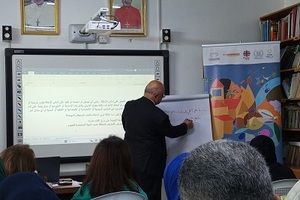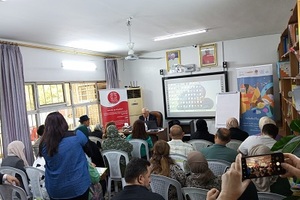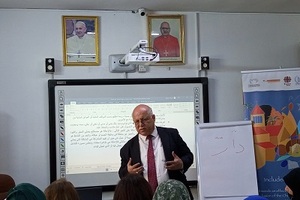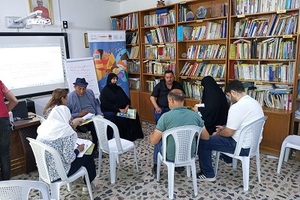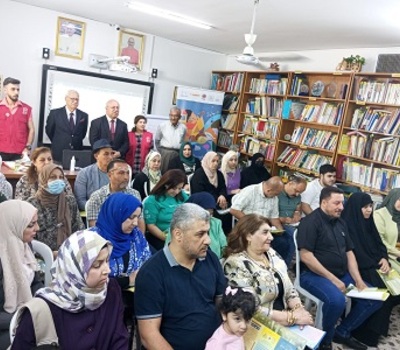
- Shedding lights on the 4th Workshop of the inclusivity of the right project
- An agenda focusing on the rights of persons with disabilities in international and Iraqi laws
- The adopted deliberative approach reveals family success stories to serve the lives of persons with disabilities
- Proposals and recommendations in favour for the rights of persons with disabilities
on Saturday the twenty-ninth of April 2023 and within the framework of the project regarding the inclusivity of the right sponsored by the John Paul II Foundation FGPII, and funded by the Italian Agency for Cooperation and Development, Hammurabi Human Rights Organization and in field cooperation with the Cartias International completed the work of the fourth workshop to raise awareness of persons with disabilities about the rights of people with disabilities within the framework of international and Iraqi legislation in that matter .
Twenty six participants including nineteen women and seven men participated in the workshop, where the agenda included four themes, the first was by Professor Hamid Shihab addressing the Universal Declaration of Human Rights as an important historical and civilizational document affirming the recognition of the inherent dignity of the human family and its equal rights to freedom, justice and peace.
The lecturer added that the wars and tragedies that prevailed in the world for many centuries caused neglect and contempt of human rights. Therefore it was necessary to formulate a document in which the individual enjoys freedom of speech and belief and is free from fear. In another mean there must be made a binding declaration to express human rights, so that the individual does not lose his right to rebel against tyranny and injustice.
In conclusion, Dr. Hamid Shihab stressed that individuals, nations and states can find their opportunities only through belief in its contents and warned of the danger of interpreting the text of the Declaration in favour of policies based on illegal benefits and concluded that the Universal Declaration of Human Rights represents the conditional case for the rights of all human groups, including people with disabilities.
At the end of the Dr. Shihab's lecture, Mr. William Warda, the supervisor of the activity, explained within a deliberative and interactive approach, the International Convention on the Rights of Persons with Disabilities, based on the legal concept on the maintenance of human dignity, stressing that this is the basis for all rights, including the right to live based on guarantees may not be neglected under any pretext.
Participants were divided into four groups to deliberate on the priorities that should be worked on to improve the conditions of persons with disabilities and what proposals and recommendations deemed appropriate. The four groups were given enough time to discuss and draw conclusions, presenting diagnoses and recommendations that were recited to participants in the workshop.
Subsequently, Warda shed light on the articles of the Constitution concerning people with disabilities, the family, the right to work and the realization of human dignity focusing on Iraqi Law No. 38 on persons with disabilities, exposing the importance of the provisions of this law being an essential source of demand for the rights of persons with disabilities in front of the government authorities that are reluctant to implement.
In an accurate summary Mr. Warda pointed out that Law No. 38 is based on five axes: Care, rehabilitation, integration, non-discrimination, recourse to the judiciary that authorities concerned has to implement the law confirming that all with disabilities have the opportunity to extract the rights stipulated in this law if they feel that there are governmental bodies that evade its application, moreover, as a result of the deliberative approach adopted, the workshop revealed success achieved by persons with disabilities and contributed to their codification, printing and distribution to others throughout the country for benefit. The workshop lasted four hours and fifteen minutes.


